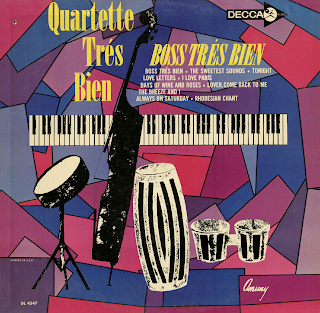In Your Own Sweet Way
The Dave Brubeck Quartet with Orchestra
Produced by Teo Macero
Columbia STEREO CS 8763
1963
From the back cover: The purpose of providing an orchestral setting for Brandenburg Gate, Summer Song and other pieces in this album is not that we presume to "make it much better," but rather that we wish to experiment with the improvisational process. Our intent was to select themes from the Quartet's repertoire and place them in a setting of various orchestral textures with the desire to illuminate newer concepts for the improvisers. At times the orchestral part dominates and leads the way; at times it is a partner in counterpoint (the orchestra's line written, the Quartet's improvised). On other occasions the orchestra remains silent or plays a modest pastel over which the jazz soloists weave their own melodies.
The "studio either he himself or some other" must make, to produce an album such as this, is of no more than passing interest to the listener and should neither add to nor detract from his ultimate enjoyment of the music. For the curious, however, permit me to point out that a great deal of "studie" goes into the preparation of a score for orchestra against which improvisation is to take place. The composer or arranger must consider, on the one hand, the personal style of each improviser and take care to allow this style to flourish rather than to dominate it by an overbuy orchestra; and, on the other hand, he must try to open new improvisational opportunities which would not exist apart from the orchestra. In my opinion, however, this effort is rather minimal compared to the problems posed for the jazz performer improvising against such a score. In this case the jazz soloist accepts for himself the challenge of immediately absorbing the orchestral score and its sound along with the harmonic, melodic and rhythmic conduct of the work itself.
In working with orchestra, The Dave Brubeck Quartet has aligned itself with a pattern found often in the history of music. From the Middle Ages to the present, it is customary to find the musical vernacular of the day making its way into the serious music of the day. (One might offer as an early example the polyphonic masses of the 15th and 16th century "pop" tune, which was used by some thirty composers, including Palestrina, as the basis for masses. Or one might cite the dance forms of the 18th century which found their way into Bach suites and the symphonies of Haydn and Mozart.) Dave has expressed the belief that there is much in the popular music of our own period which has equal validity and should be used in our concert halls if such places are to be anything more than museums of the past.
With one exception the pieces in this album were heard in symphonic concerts before they were recorded. It is encouraging to realize that they were written with the primary impetus coming from orchestra societies with an enlightened policy of programming, which included a recognition of jazz along with other more traditional works. These pieces, along with "Bernstein Plays Brubeck Plays Bernstein" (CL 1466 / CS 8257), have been performed by symphony orchestra in such varied cities as Cleveland, Fresno, Grand Rapids, Los Angeles, Monterey, New York, Oakland, Quebec, Sacramento, St. Louis and San Diego, my home, where the first such performance took place at the invitation of Robert Shaw and the San Diego Symphony in 1956. The inspiration for most of the pieces in this album dates back to that time and in the ensuing five years several works were added to the repertoire of the Quartet plus symphony or chamber orchestra, culminating with the recording session in New York the summer of 1961 which produced this album.
From Billboard - November 23, 1963: Soaring strings and woodwinds are added in this set featuring the jazz combo and Paul Desmond. Side 1 is Brandenburg Gate, while side 2 spotlights "Summer Song," "In Your Own Sweet Way," "G Flat Theme" and "Kathy's Waltz."
Brandenburg Gate
Summer Song
In Your Own Sweet Way
G Flat Theme
Kathy's Waltz















